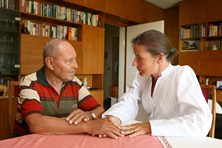Communicating with Your Loved One's Healthcare Team


You can make a difference in your loved one’s health. It just takes a little effort and time.
How Can You Prepare Before Each Medical Visit?
To prepare before each medical visit:
- Make a list of questions. Put the most important questions first.
- Describe the problem or symptom on paper. Note when each symptom occurs, how long it lasts, and what makes it better or worse.
- Write down changes in your loved one’s diet, mood and behavior.
- Bring stroke information you learned from friends, the media or on My HealtheVet and the Internet.
- Bring a list of all your loved one’s medicines. Include vitamins and over-the-counter medicines.
- Bring results of tests and reports of visits to non-VA medical offices.
How Do You Involve Yourself During Each Medical Visit?
Communicating with your healthcare team isn’t always easy. Show interest in your loved one’s health. You’ll be surprised with the results.
- If possible, let your loved one take the lead.
- Update the provider on your loved one’s health changes. Tell the provider if treatments or medicines are not working.
- Take notes.
- Bring up any point the healthcare provider did not cover.
Use Your Time with Your Healthcare Team Wisely
Providers only have a short time to talk. Remember to do the following:
- Talk about the most important concerns first.
- Be brief and stick to the point.
What Questions Should You Ask? 
Ask the provider to explain anything you don’t understand.
- Ask the provider about the survivor’s diagnoses and what to expect.
- Find out different choices for treatments.
- Find out why tests are being done.
- Ask why your loved one is taking each medicine.
- Talk about local stroke support groups and other resources in your area.
Make Sure You Understand the Provider
- Repeat instructions or treatment information. Ask if you understood correctly.
- Call the provider’s office later if you are unclear.
- Ask pharmacists questions about medicines.
Contact your healthcare team with new problems and adverse effects from medicines. Your healthcare team wants to know right away about new symptoms.
How Can My HealtheVet Help You?
Ask a VA staff person to show you how to use My HealtheVet. With just a few clicks on My HealtheVet (www.myhealth.va.gov) you can keep track of personal health information. For example, you can record blood pressure readings and daily weights. You can find handy tools to record medicines and lab test results. Print and bring this information to visits with the healthcare team.
Remember
- Make a list of questions to ask the healthcare team.
- Use your time wisely on each medical visit. Stick to the point.
- Be sure you understand what the provider tells you.
Other Resources 
Additional credible resources on this topic can be found here. Website pages may change or update, therefore if a link does not work, you may also try to type the information into your internet search bar. This Resource List will be updated frequently.
|
*Link Disclaimer: Links to information and Web sites outside of the Department of Veterans Affairs do not indicate an endorsement of products or services offered by the sites. In addition, these sites may have privacy and security policies that are inconsistent with those of VA. |
References: AARP. (2003). How to talk to your doctor. Retrieved June, 18, 2008, from: http://www.aarp.org/health/conditions/articles/ask_questions.html*; National Institute on Aging. (2008). Talking with your doctor: A guide for older people. Retrieved June, 18, 2008, from: http://www.nia.nih.gov*.
These materials were created for the project:
Web-Based Informational Materials for Caregivers of Veterans Post-Stroke
Project Number SDP 06-327 funded by VA HSR&D Quality Enhancement Research Initiative (QUERI)



















